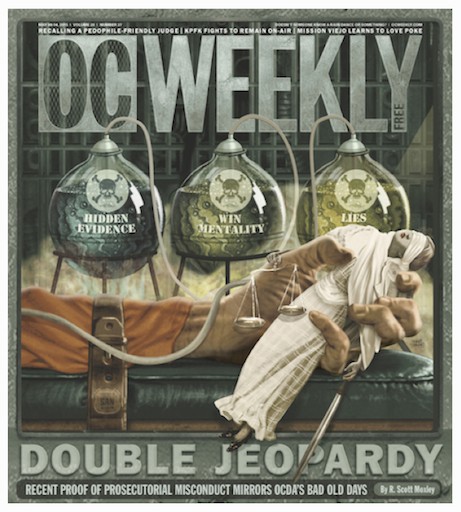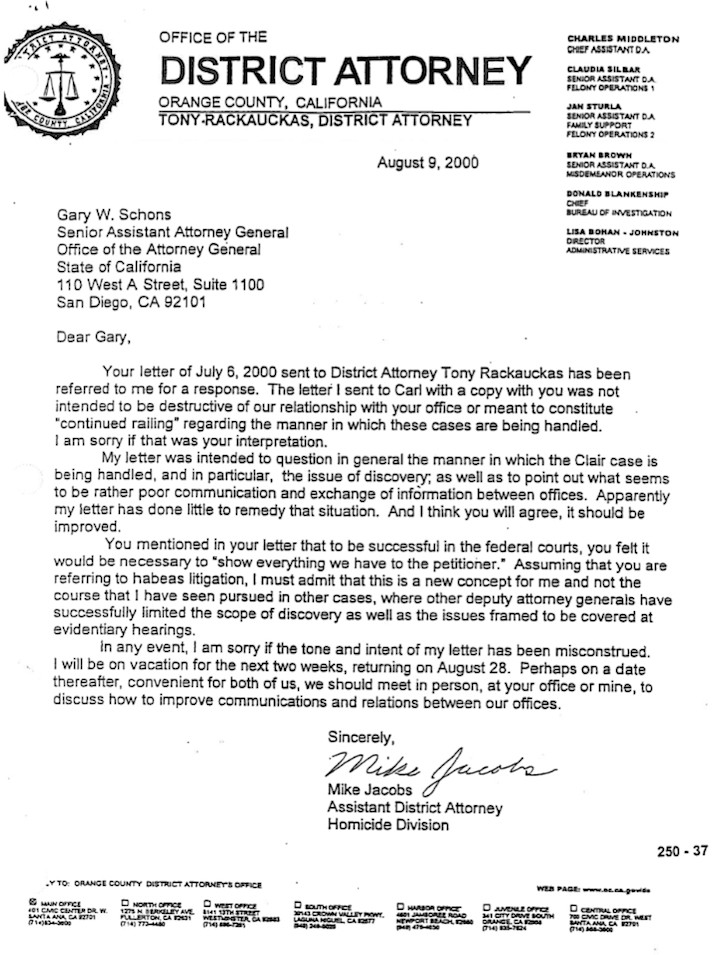
Inside the Orange County district attorney’s office (OCDA) from the mid-1970s through 2001, homicide prosecutor Michael A. Jacobs apparently saw himself as the Terminator.
According to newly obtained court records, Jacobs bragged to other lawmen that they could not match his enthusiasm for executing defendants in capital cases, claiming at one point that his office was responsible for 50 percent of expected state-sponsored killings after California resumed enforcing the death penalty in 1992.
Weekly readers may recall Jacobs, who was highlighted in our May 6, 2015, cover story, “Double Jeopardy: Recent Proof of Prosecutorial Misconduct Mirrors OCDA’s Bad Old Days.” The article noted that evidence proved this prosecutor repeatedly withheld exculpatory evidence that would have weakened his cases and employed blatantly dishonest jailhouse informants to sell his claims to juries.
Incredibly, Jacobs won two convictions for the 1981 Laguna Beach murder of Ginger Fleischli by arguing diametrically opposing sets of facts to different juries for David Leitch, who was given a term of 15 years to life, and Thomas Thompson, who was executed in 1998 while proclaiming his innocence to the end.
The Thompson case was and remains such an ugly eyesore on the judicial system that prominent homicide prosecutors across the nation publicly announced their disgust at Jacobs’ tactics.
In the county’s current snitch scandal, District Attorney Tony Rackauckas–once Jacobs’ colleague and later his boss–has insisted the present déjà vu over evidence hiding and informant cheating by prosecution teams is nothing but innocent mistakes due to ignorance from a lack of training.
(Never mind that the supposedly unintentional mistakes somehow managed to benefit prosecutors 100 percent of the time.)
Though he’s reluctantly conceded errors, Rackauckas also says that complaining defense lawyers like Scott Sanders, Rudy Loewenstein, Gary Pohlson and James Crawford have manufactured a fake scandal that doesn’t deserve the national attention its receiving from news outlets like the New York Times and Washington Post.
But internal government records first obtained by the Weekly in recent days show that Rackauckas was well aware of serious allegations of prosecutorial misconduct in death penalty cases from the outset of his administration 16 years ago and took no corrective action.
Worse, these records cast Jacobs, the proud killing machine, as an obnoxious character with a win at all costs mentality–an assessment not advanced by lefty, anti-death penalty activists but rather fellow death penalty prosecutors.

A three-year letter exchange between OCDA and the California Attorney General’s office from 1999 to 2001 after Thompson’s controversial execution shows Jacobs complaining that deputy AG’s didn’t relish executions as much as he did and weren’t as willing to hide key records from death row defendants complaining in appeals of government cheating.
“Death penalty appellate work is not easy,” Jacobs lectured Supervising Deputy Attorney General Carl H. Horst on June 29, 2000, about three pending appellate reviews of capital cases from Orange County. “Just as with trial work, it requires aggressiveness, hard work, and an ‘I can do’ attitude instead of a ‘head in the sand and I hope the judiciary will save me’ approach; because they won’t.”
Specifically in connection with People v. Kenneth Clair, he blasted Horst.
“If you lack the drive, the optimism, and the willingness to put in the hard work to make certain that this case is affirmed on appeal, then perhaps you should consult with your supervisor about having someone else in your office take over the lead on this case,” wrote Jacobs, who also mentioned his dissatisfaction that in People v. William Charles Payton and People v. John Visciotti the death penalty convictions seemed “to be at risk” in his mind. “We are hoping everything will be done to avoid reversals and retrial of these cases after 15 or 20 years. Hopefully, you do to [sic].”
When a federal judge ordered that Jacobs surrender to the Clair defense a “box load” of previously hidden documents, he told Horst, “I am far from satisfied with the work done [by the AG’s office] opposing these [discovery] requests.”
In a separate letter to Peter Siggins, then-chief deputy Attorney General for Legal Affairs in Sacramento, Jacobs echoed his contempt.
“I still see no change in the overall lack of aggressiveness and thoroughness in the handling of a number of these [death penalty] cases,” he wrote.
AG management, including then California Attorney General Bill Lockyer, were not amused by Jacobs’ attacks, suggesting that death penalty appellate work wasn’t similar to a rapidly moving conveyor belt where troubling facts can be brushed aside without consequences.
[
David P. Druliner, chief assistant Attorney General for the criminal division, bristled in response to Jacobs’ criticisms about the office that handled capital appeals for the OCDA.
“Contrary to Mr. Jacobs’ suggestion, the San Diego office’s record in capital litigation suggests a high level of competency, aggressiveness and professionalism by the deputies assigned to the cases,” Druliner told Rackauckas.
In an August 9, 2000, letter, Jacobs mocked Deputy Attorney General Gary Schons for “believing it would be necessary to ‘show everything we have to the petitioner'” and observing, “I must admit that this is a new concept for me and not the course that I have seen pursued in other cases, where other deputy attorney generals have successfully limited the scope of discovery as well as the issues framed to be covered at evidentiary hearings.”
But probably one of the biggest, previously unknown bombshells in the records is the AG’s allegation that Jacobs may have committed perjury to cover up his snitch cheating with informant Daniel Escalera in hopes of keeping Payton on death row.
“Documents in Escalera’s superior court file directly contradict and possibly impeach Mr. Jacobs’ deposition testimony in which Mr. Jacobs testified he was not present and did not participate in Escalara’s change of plea and sentencing,” Druliner explained to the DA. “Escalara’s court file clearly shows that Mr. Jacobs participated in Escalara’s change of plea on October 30, 1981. Indeed, Mr. Jacobs even signed the change of plea form. Additionally, Mr. Jacobs was present at Escalara’s sentencing on February 26, 1982, and participated in an in-chambers conference with the court and defense counsel, contrary to his deposition testimony that he was ‘certain’ he never went into chambers for a conference regarding Escalara.”

Why does any of this matter? The public must be able to trust prosecutors who send people to death row. But more exactly in the Payton appeal, defense lawyers claimed Jacobs misled a jury about a secret deal to secure Escalara’s pro-prosecution testimony in exchange for a reward: leniency in a robbery case.
“Mr. Jacobs has consistently maintained that he did not promise Escalara anything in exchange for his testimony against Payton,” observed Druliner. “Notably, six days after the death verdict was rendered against Payton, Escalara’s attorney wrote a letter to the probation officer prior to Escalara’s sentencing.”
That letter stated, “Certain promises relating to Mr. Escalara continuing to work with law enforcement and testify in the aforementioned superior court prosecution of Mr. Payton were discussed, which led to the ultimate plea of guilty by Mr. Escalara.”
AG officials decided to accept the stance that there had been no deal after Escalara’s lawyer refused to concede there had been any secret arrangement, according to court records.
In Payton, Druliner also blasted the OCDA for attempting to violate Brady, a court rule that requires prosecutors to surrender pro-defendant evidence to defense lawyers. Jacobs and his colleagues were unwilling to turn over entries from Orange County’s Informant Index which showed Escalara had previously placed a hit himself on another informant. The AG’s office was stunned by the secrecy and threatened to disclose the evidence if the DA’s office refused, a move that forced compliance, according to court records.
Though an older example of questionable conduct, the concealment of the informant index in violation of Brady remains an ethical issue Rackaukas and his staffers have struggled to correct even up through recent months.
The California Supreme Court eventually found Jacobs committed misconduct in the closing argument of the case but voted 5 to 2 to opine that the tactic was “harmless” to Payton’s defense.
Rackauckas fired the prosecutor in April 2001, telling him he was “rarely punctual, not dependable and difficult to reach during working hours and that you are not accountable,” according to court records.
Jacobs nowadays maintains an Irvine private practice, denies ever pressuring the AG to withhold records and said any correspondence that alleges such “are likely fabricated.”
“As far as writing anything criticizing the AG’s office for giving too much information to defendants on their appeals, I don’t know what you’re talking about,” he wrote in an email.

After OCDA prosecutor Matt Murphy recently defended Jacobs’ conduct as righteous, Sanders, who represents the defendants in People v. Daniel Wozniak and People v. Scott Dekraai, attached the AG-OCDA correspondence to an October 15 court filing.
It’s Sanders’ contention that because of the “troubling history,” Orange County prosecutors still “cannot be reasonably relied upon to turn over mitigating evidence” and therefore the ultimate punishment must be removed as a sentencing option.
According to the California Department of Corrections, Payton remains on death row at San Quentin State Prison, where he’s been living since 1982.
Appellate judges are currently reviewing Superior Court Judge Thomas M. Goethals’ March decision to recuse Rackauckas and his entire OCDA’s office from Dekraai because of perjury and evidence hiding committed by members of the prosecution team.
Susan Kang Schroeder, OCDA chief of staff, says the office is constantly looking for ways to improve operations, has already instituted discovery and informant reforms and can be trusted to seek justice, especially in death penalty cases.

CNN-featured investigative reporter R. Scott Moxley has won Journalist of the Year honors at the Los Angeles Press Club; been named Distinguished Journalist of the Year by the LA Society of Professional Journalists; obtained one of the last exclusive prison interviews with Charles Manson disciple Susan Atkins; won inclusion in Jeffrey Toobin’s The Best American Crime Reporting for his coverage of a white supremacist’s senseless murder of a beloved Vietnamese refugee; launched multi-year probes that resulted in the FBI arrests and convictions of the top three ranking members of the Orange County Sheriff’s Department; and gained praise from New York Times Magazine writers for his “herculean job” exposing entrenched Southern California law enforcement corruption.

